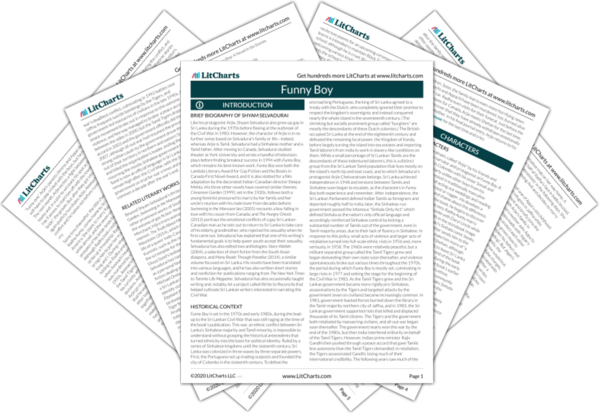Masculinity and Queerness
Set from the late 1960s to the early 1980s in Sri Lanka, Funny Boy follows the childhood and adolescence of Arjie Chelvaratnam as his nation hurdles toward civil war. At the same time as he watches Sri Lanka’s Sinhalese majority gradually turn against his minority Tamil community, Arjie comes to terms with the consequences of being gay in a patriarchal culture and family. From his earliest days, Arjie fails to meet his family's expectations of…
read analysis of Masculinity and QueernessForbidden Love and Family
While Funny Boy's most important love story is undeniably about Arjie discovering his sexuality and meeting Shehan, the vast majority of the book follows other relationships, in all of which people fall in love across, despite, and even because of the social boundaries that separate them. Like Arjie’s sexuality, these forbidden relationships draw familial ire; and yet, whereas Arjie learns to accept his sexuality despite his family’s criticism, the book’s forbidden relationships seem…
read analysis of Forbidden Love and FamilyNationalism, Ethnic Conflict, and Violence
Behind Arjie’s coming of age, Funny Boy also traces the lead-up to the Sri Lankan Civil War, a growing tension between Sri Lanka’s Sinhala majority and sizable Tamil minority that eventually erupts into violent conflict and becomes the book’s driving force, uprooting Arjie and his family forever. And yet Selvadurai presents this ethnic conflict from the perspective of a boy who scarcely cares about ethnicity. In doing so, he sheds light on the fundamental…
read analysis of Nationalism, Ethnic Conflict, and Violence
Justice, Power, and Moral Awakening
As it follows Arjie’s coming of age, Funny Boy also becomes a tale of moral development: Arjie encounters and grapples with blatant injustices that challenge his initial faith in human goodness. Yet, rather than giving up on the idea of a just world and resigning himself to the self-interested worldviews of those around him—including, at times, his own family—Arjie continues to pursue the just world he recognizes as impossible. Nevertheless, in responding to the…
read analysis of Justice, Power, and Moral Awakening






